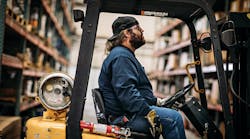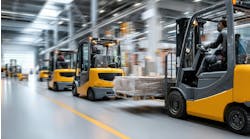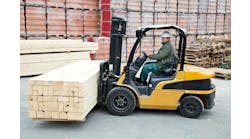Propane has been powering forklifts for decades and even as new options emerge, propane forklifts have proven their staying power. Propane currently holds about 90% market share for Class 4 and 5 forklifts, according to data from the Propane Education & Research Council. Among those surveyed, a majority of fleet managers—70% of them from the 5,000-10,000 lbs. capacity range and 51% from the 10,000 lbs. and up capacities—said they preferred propane to diesel or electric.
As a fuel source, propane checks all of the boxes that facility managers say they care about: it’s local, it’s clean and it’s safe.
A Domestic and Abundant Fuel
Facility managers may not realize it, but propane is a versatile alternative fuel used all over the United States. Propane is being used by nearly 12 million U.S. households for residential uses like water and home heating, and by millions of Americans for transportation, commercial, industrial and agricultural applications.
According to the Department of Energy, more than 90% of U.S. propane supplies are produced in the U.S. The American-made fuel keeps jobs in the U.S. and as of 2012, more than 145,000 workers across the country were employed in propane trade, wholesale and sales.
Propane is also an abundant fuel. Today, the U.S. produces more than enough propane to go around. In fact, the U.S. is propane’s leading producer. After it’s produced, propane travels around the country through a network of pipelines, railroad tank cars, tractor-trailers and barges—creating about 80,000 American jobs along the way. From regional storage sites nationwide, propane is then sent to distributors.
Cleaner Operation
Since the 1990s, the industry has seen a shift toward cleaner business practices. A growing number of businesses are focused on a low-emissions operation. There are many ways facilities can become “greener” or more energy efficient, one of which includes the type of equipment and fuel they choose to move materials on a day-to-day basis.
While this trend has helped give rise to electric forklifts, propane has kept pace because of its low-emissions profile. Propane is a low-carbon alternative fuel that can produce significantly fewer emissions than diesel and electricity in a wide range of applications.
PERC, in partnership with the Gas Technology Institute, conducted a comparative emissions analysis of targeted applications in key propane markets, including forklifts. The report analyzed full fuel-cycle energy consumption, greenhouse gas, and criteria pollutant emissions (nitrogen oxide and sulfur oxide).
The study revealed that, when compared with electric forklifts, propane can reduce sulfur oxide (SOx) emissions by 76%. When it comes to emissions, propane having an edge over electric may come as a surprise to some material handling professionals, as electric’s full emissions profile is often overlooked. While electric equipment produces zero emissions during normal operation, it’s important to account for the emissions produced in the creation and transmission of electric batteries. That includes all of the emissions produced at coal-fired plants where electricity is generated, as well as the emissions during transportation to the facility. When the full emissions profile is considered, electric isn’t as impressive.
Propane forklift engines can produce 97% fewer hydrocarbon and NOx emissions when compared with similarly-sized diesel forklift engines without any drop-off in payload or power. Plus, well-maintained propane forklifts meet or exceed nationwide indoor air quality standards, while diesel models produce higher amounts of carbon monoxide and other harmful emissions. Because of this, propane forklifts have the versatility to work indoors and outdoors.
As the trend toward clean, emissions-reducing alternative energy sources continues, renewable propane will become a more common phrase in the energy conversation. It’s estimated that by 2040, renewable propane will supply nearly half of our nation’s propane demand. Renewable propane is a byproduct of the renewable diesel and jet fuel production process, which converts plant and vegetable oils, waste greases, and animal fat into fuel. Because it’s produced from renewable, raw materials, renewable propane is cleaner than conventional propane. And considering its chemical structure and physical properties are the same as traditional propane, renewable propane can be used for all the same applications.
Enhancing a Facility’s Safety Culture
Safety is an important topic in the material handling, distribution and logistics industry. Just like the type of material handling equipment affects a business’ sustainability efforts, their choice of equipment can impact employees’ safety, too.
Due to the nature of the equipment, forklifts introduce some workplace risks. That said, the choice of fuel does make a difference and propane can help circumvent some potential hazards for employees. For example, operators using propane-powered forklifts can avoid electrical hazards from electric forklift recharging equipment, hazardous spills from diesel-fueled equipment, and chemical spills from lead-acid battery-powered forklifts. And rather than handling heavy forklift batteries, propane users can swap out an empty propane cylinder for a full one.
Local propane suppliers can act as a safety resource in a variety of ways, including inspecting cylinders each time they’re exchanged and removing damaged cylinders from service; ensuring all employees understand how to install propane cylinders on their forklifts safely; and some suppliers offer additional safety training opportunities for forklift customers.
Jeremy Wishart is director of off-road business development for the Propane Education & Research Council, a non-profit operated and funded by the propane industry.



